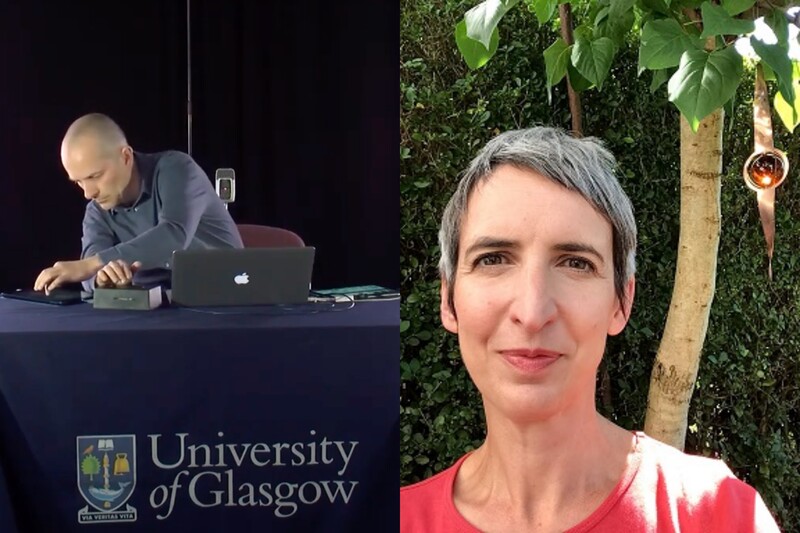The Electronic Intifada 22 March 2022

Glasgow university censored a paper examining the pro-Israel lobby. (WikiMedia Commons)
A Scottish university refused to properly assess pro-Israel complaints about a peer-reviewed article in one of its journals.
Instead of sending the complaints to the author of the paper for further peer review, the university asked a staff member “close to the [subject] area” to give an informal view.
University documents released under freedom of information rules show it was agreed that the paper – which discussed the Israel lobby in Britain – should also be sent for external review, but this seems not to have been done.
But even this was only agreed after the university had already decided on its response – to endorse the baseless smears of the complainants.
The university is still refusing to reveal who complained about the paper. But extremist anti-Palestinian blogger David Collier has been public about his involvement.
The original article by Jane Jackman – published by eSharp, a University of Glasgow journal, in 2017 – examined the propaganda activities of the Israel lobby in the UK.
After complaints by pro-Israel activists in 2020, the university last year appended a statement to the article alleging it contained problematic features, including the idea that it promotes “an unfounded anti-Semitic theory regarding the state of Israel.”
After a high profile open letter to the university signed by 500 prominent academics including the linguist and political analyst Noam Chomsky, the university removed the reference to anti-Semitism.
But it refused to remove the baseless claim that the paper had used a “biased selection of sources,” claiming that the article promoted “‘what some would regard as an unfounded theory.” This wording obviously still implies that the article is anti-Semitic.
Violation of ethics
Britain’s Committee on Publication Ethics has produced a set of guidelines on how academic journals should respond to complaints about published articles.
The committee advises that when complaints are received, journals should “invite the original authors of the critiqued article to write a reply” and that “the critique and response may be peer reviewed.”
Although eSharp is not a member of that committee, the guidance is widely accepted by academic journals.
As The Electronic Intifada reported last year, Jane Jackman was not invited to respond. In fact, the first she heard about it was via an anti-Palestinian newspaper, The Jewish Chronicle, which reported on the university’s apology for publishing her article.
The Committee on Publication Ethics also advises that critiques of published papers “should have evidence or data to support the claims” they contain.
This requirement was not met by Glasgow university. None of the documents released in response to our freedom of information request give any evidence for the claims of anti-Semitism or bias.
What was, however, discussed repeatedly by senior university staff as a reason for the censorship of Jackman’s paper was the International Holocaust Remembrance Alliance’s bogus defintion of anti-Semitism.
Although widely criticized by scholars and lawyers, and rejected by most UK universities, the definition has been pushed by Israel and its lobby around the world. It conflates criticism of Israel and its racist official ideology Zionism, on the one hand, with anti-Jewish hatred, on the other.
Expert opinions spurned
The journal eSharp is published by Glasgow university and is targeted at graduate students.
The journal states that it peer reviews articles, assigning “two reviewers to each paper, making sure that those reviewers have a degree of expertise in the subject matter dealt with in the article.”
But the emails disclosed by the university reveal that the university staff primarily responsible for the apology had no such expertise.
The Electronic Intifada has seen copies of the original anonymous peer review responses. The first stated that the article is a “relevant topic,” asks for “further analysis” and more “signposting.”
The second stated the article was “really engaging and informative” and that it provided “a fresh look into a widely debated phenomenon” and that the “overall argument was a very strong one.” Suggested improvements were made concerning minor grammatical errors, compliance with a style guide and issues with structure.
But it was made clear that “these are just small issues.”
There are no grounds to think that the peer review comments are inadequate and nothing in the Glasgow response has suggested that.
Given the existence of a peer review process, any challenges to the outcome of that process should also require a review of at least equal seriousness.
But the university subverted its own processes by sidelining the editorial team at the journal and putting the complaints in the hands of two academics with no relevant expertise.
Emails released by the university reveal that the lead role in the censorship effort was taken by Nick Fells, a professor of music, and by Bryony Randall, a professor of modernist literature.

Nick Fells at work (left). Bryony Randall (right). The pair led censorship efforts at Glasgow university. (YouTube/Glasgow university)
Although the paper was published in 2017, the complaints only started in December 2020, after a blog post by the extreme Zionist David Collier.
As The Electronic Intifada reported, Collier urged his followers to contact the university. Although Collier has almost 74,000 Twitter followers, only 11 formal complaints were received, a university document shows.
Having agreed a line of approach with senior colleagues, Nick Fells proposed in early February 2021 that “it would be sensible to approach the current editorial team” in order to find out “what their response to the situation would be.”
But already the assumption had been made that the complaints would not be rejected.
At no point in the disclosed documents does anyone at the university consider the possibility of rejecting the complaints – despite the fact that they did not give any evidence showing anything in Jackman’s article was incorrect.
The “main questions” were stated as being: “should the paper be removed; or should it remain, but perhaps have some kind of editorial written, which itself might invite further contribution and debate.”
A meeting was duly convened with the editorial group, where it was decided “to leave the article in place, but to write an editorial in response.”
By early March, Fells had accessed “perspectives” on the article “provided by a colleague close to this area.” Fells pointedly does not name the colleague.
The decision to add an editorial note to the original paper was taken – according to the documents – in the absence of any other advice than that given by this informal internal adviser.
The advice was that the article “places itself in the midst of a familiar controversy, that pro-Zionist Jews in Britain are a means by which Israel exercises soft power to advance its cause.”
Rather than dispute this fact, the advice asserted that the article crossed “a fine line from criticism of a government to the restatement of anti-Semitic tropes.” But – again – the email did not explain where this “line” was or how the article had crossed it.
It claimed the paper was “problematic in its discursive strategies” and that aspects of it “would therefore be likely to cause offense.”
This advice is worth some scrutiny. There is no real controversy about whether “pro-Zionist Jews” engage in pro-Israel advocacy. They do, along with pro-Zionist non-Jews.
Do some co-ordinate or collaborate with the state of Israel? Indisputably yes.
Journal editors marginalized
The allegedly problematic “discursive strategies” and “biased” sourcing have still not been specified.
After meeting the editorial team of eSharp, Nick Fells wrote an email with a note summarizing a plan of action to be sent to senior management. The general editor of the journal in 2021 was Caleb Rogers.
The documents reveal that the editor had not seen the original complaints.
It would “be good if at all possible, if I could see some of the complaints in more detail,” one of the emails – apparently written by the editor – reveals.
Fells declined to share details of the complaints with the editor – a lack of transparency which was continued by the university’s freedom of information department when it later refused to release them or name the complainants.
The editor also stated: “I wonder if it might be good to consult with an expert in this field now.” This too was dismissed.
Both of these actions appear to be clear breaches of academic freedom and a subversion of any proper peer review process.
The documents state that the editorial was required to be sent “for final approval prior to publication” to five senior management figures. Overall, the process of dealing with the complaints was run by university management with what appear to be only courtesy meetings with the editorial team of the journal.
Atone for the damage
The Glasgow story is a cautionary tale for those who hope that public institutions will respond to politically motivated complaints of anti-Semitism by relying on evidence and following standard procedures.
Instead the University of Glasgow has capitulated to, facilitated and protected anonymous complainants operating to pursue the foreign policy objectives of a hostile foreign state.
Glasgow is on the back foot, having had to remove the term “anti-Semitism” from the supposed “editorial” it added to Jackman’s paper.
But there is a long way to go before it reverses course and atones for the damage it has caused, both to the reputation of Jane Jackman and to academic freedom at the university.
A fulsome apology to Jackman is the first step in a process which must see the university fully overhaul its complaints procedures.
David Miller is the co-editor of the book What is Islamophobia? Racism, Social Movements and the State.




